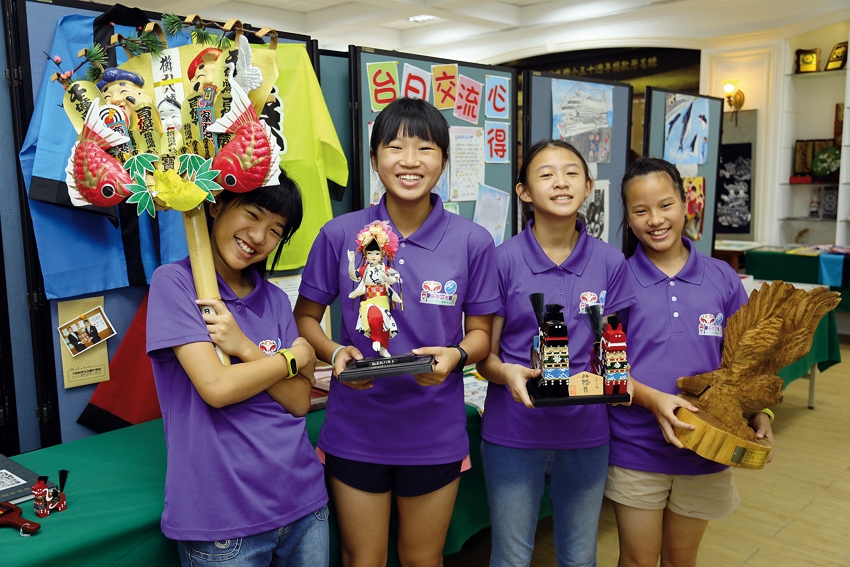
Students who visited Japan’s Kitazono Elementary School this June happily show off their souvenirs from the exchange program. (photo by Jimmy Lin)
“Two Norths, One Heart,” a friendship that has lasted 18 years: Pei-cheng Elementary School in Yilan County and Kitazono Elementary School, its sister institution in Aomori Prefecture in Japan, share the Chinese character for “north” in their names (pronounced bei in Chinese, kita in Japanese). They have forged a close relationship through regular cultural exchanges.
Yilan County has adopted a three-level athletic training program as a key element of its physical education policy. Working through nearly 70 local committees, the Yilan County Athletic Association underpins this program by contributing financial and physical resources to support the prospective national athletes and their coaches. Over the years, Gong Jheng Elementary School has been cultivating young talent from nursery school onward, implementing the three-level training policy by promoting Sports for All and by staging competitions in various athletic disciplines, with the aim of nurturing future national athletes who will do their best to win medals at the Tokyo Olympics.
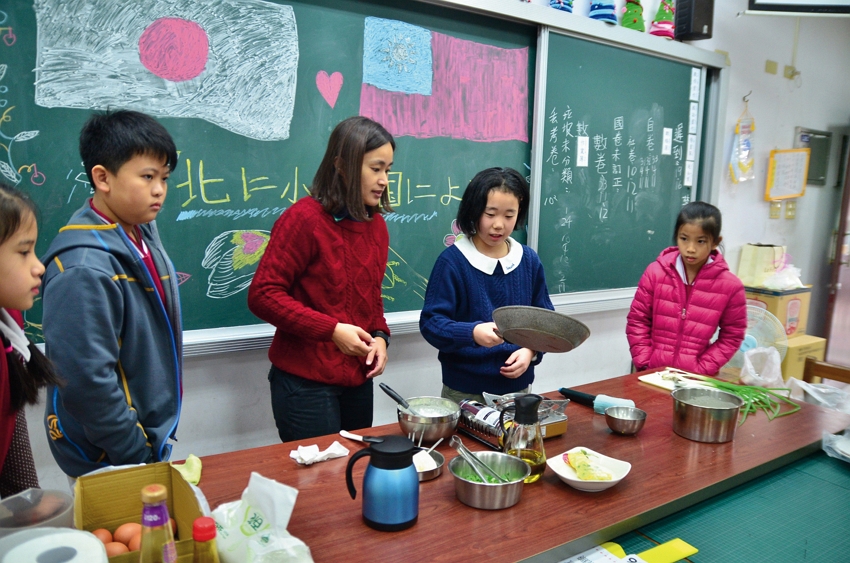
The teachers and students at Pei-cheng Elementary School take pains to showcase authentic Taiwanese food and culture so as to create lasting memories for the visitors from Japan. (courtesy of Pei-cheng Elementary School)
Sister schools, intimate ties
Seated in a row behind a conference table, a group of well-turned-out schoolchildren are expressing themselves politely and eloquently. These are this year’s goodwill ambassadors, dispatched from Pei-cheng Elementary School on a Taiwan-Japan exchange mission. “The ‘Two Norths, One Heart’ cultural exchange program is now in its 18th year,” says headmistress Liu Poling. It was in September 2000 that Pei-cheng Elementary began to visit Japan. Two years later, Kitazono Elementary returned the visit, and the two schools formally became sisters. In June this year, Liu Poling continued the tradition by bringing 39 parents, teachers and students to Kitazono Elementary, where they engaged in artistic and cultural exchanges. Liu Poling—whose policies set great store by the humanities, LOHAS, science and art—not only focuses on cultivating local sensibilities but also continues the school’s tradition of opening up international perspectives. The “Two Norths, One Heart” exchange program is a key aspect of the humanities curriculum.
“We were all looking forward to visiting Japan on the exchange trip. Although we spoke different languages, we could communicate through body language.” Sixth-graders Zhu Yunzhen, Zhu Yunshang, Lin Kaixin and Zhong Xinyan have all served as “Welcoming Angels.” “They performed a Japanese tea ceremony for us and told us about the rules of etiquette in the Way of Tea.” Fourth-grader Lin Shiyun took part in the exchange program for the first time and was very excited about the opportunity to attend classes in the Japanese school. “Since we came back, I’ve been giving thanks to my family before and after meals, in accordance with the rules of etiquette”—Zhuang Zixin now puts her sense of filial gratitude into practice by expressing her respect. Guo Yongqi, fluent in Japanese, is also happy to have got to know more about Japanese life.
Prior to their visit, Pei-cheng Elementary School organized a three-month training course for the children, ranging from language, through arts and crafts, to life skills education. Ou Yiwen—a volunteer teacher for the school’s Japanese language society—played an indispensable role in the training course. She is a parent of one of the children who went on the exchange visit, and was also an important point of contact. Together with her Taiwanese friend Chunhui Oyama, who has emigrated to Japan, Ou Yiwen built a bridge of friendship between Taiwan and Japan; both of them poured their efforts into the project.

Liu Poling, headmistress at Pei-cheng Elementary, sees the exchanges between the sister schools, which have been going on for 18 years, as a key part of the humanities curriculum.
Life skills education
“Kitazono Elementary spared no effort in welcoming the delegates from Pei-cheng Elementary.” Everyone was impressed with the Japanese hosts’ meticulous and serious attitude. “The welcome event was hosted by students. From the arrangement of seats to the preparation of food, everything was orderly, and there was no noisy behavior.” Liu Poling thinks that the greatest benefit her students gained from the exchange in terms of life skills education is an insight into the way etiquette shaped the Japanese students’ personal character, their concentration and attentiveness, and their sense of discipline and self-control.
Pei-cheng Elementary School and its parents’ association allocate funding annually in order to sustain this exchange program. The collaboration between the parents on both sides has built a lasting friendship that provides powerful support for the program.
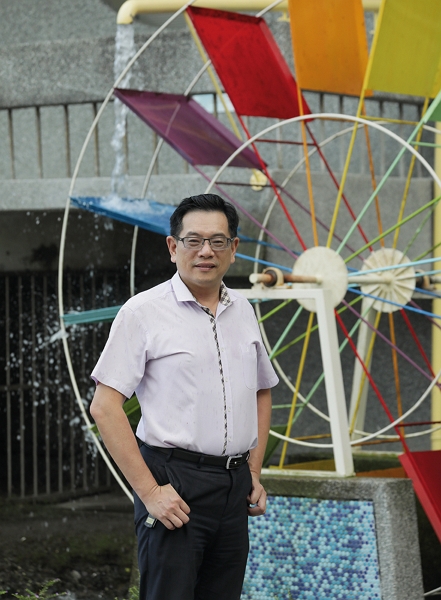
Chien Hsin-pin, headmaster first at Pei-cheng Elementary and now at Gong Jheng Elementary, has devoted himself to Taiwan–Japan exchanges and to nurturing national athletes.
When the Japanese visitors come to Pei-cheng Elementary, the whole school mobilizes to give them an equally warm welcome. Because the visits are brief, both teachers and students make painstaking preparations in order to present the most authentic Taiwanese food and culture so as to leave a deep impression on the visitors.
“When it’s time to say goodbye, the children always hug each other and cry,” says Chien Hsin-pin, who twice led groups to Japan and welcomed visitors from Japan during his eight years as headmaster at Pei-cheng. Although the exchanges are usually as brief as two days, the children’s friendships seem to transcend time and distance. Stirred up by the occasion, their emotions suddenly overflow.
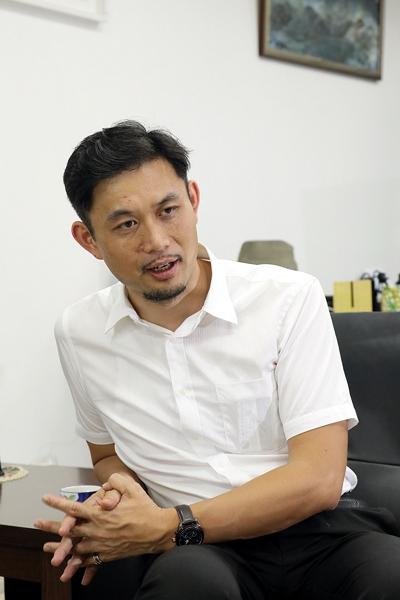
Wang Hung-hsiang, director general of the Yilan County Education Department, says the three-level training program aims at seamless progress, with an eye to the Olympics.
Three-level training
In addition to cultivating Taiwan-Japan relations from elementary-school level onward, Yilan County is implementing a comprehensive plan to nurture athletic talent by giving training in schools at elementary, junior high and senior high school levels. “The county magistrate places a high premium on education; however difficult it is, we will never cut education budgets.” Wang Hung-hsiang, director general of the Yilan County Education Department, says that excellent athletes will be given full recognition and rewards, as well as administrative support. “Our ultimate goal is to train athletes at all three levels.” For example, current national athletes such as the pommel horse champion Lee Chih Kai, the rings champion Chen Chih Yu, and Tang Chia-hung, the horizontal bar gold medalist at the Asian Games, are all athletes whose talents were nurtured at Gong Jheng Elementary School under the three-level training policy Wang hopes that Lee Chih Kai and Tang Chia-hung will shine at the 2020 Olympics in Tokyo and do great honor to Taiwan.
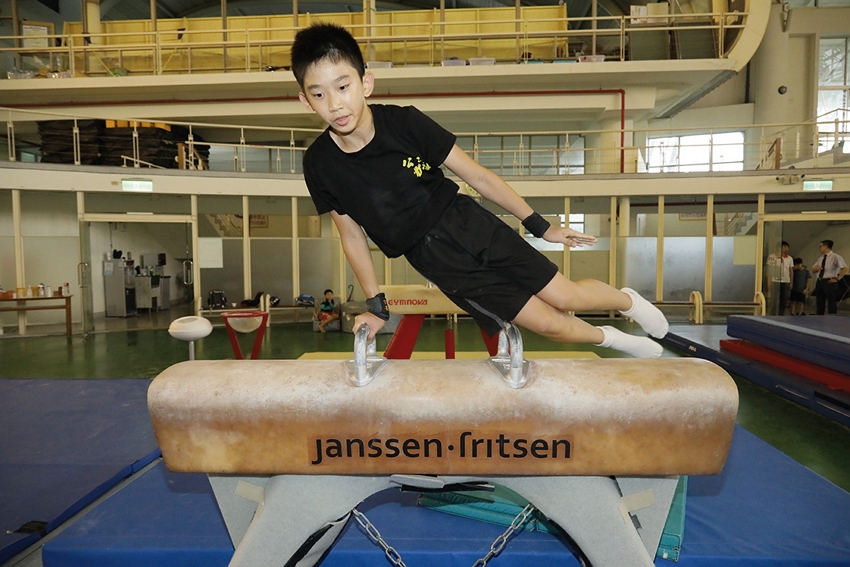
Chen Yushu, a sixth-grader at Gong Jheng Elementary, participated in the 2018 national gymnastics championship, taking second place in the team competition for fifth- and sixth-graders, and fourth place in the floor exercises for individuals.
Cai Gangzhi, chairman of the Yilan County Athletic Association, says: “We now have 70 committees tasked with promoting and training athletes; 50 of them cover Olympic sports.” Bringing to bear a wealth of social resources, the association has been offering unfailing support to the training of athletes. They have made a particular effort in the recruitment of coaches, training talented athletes through a policy of “One Township, One Focus.”
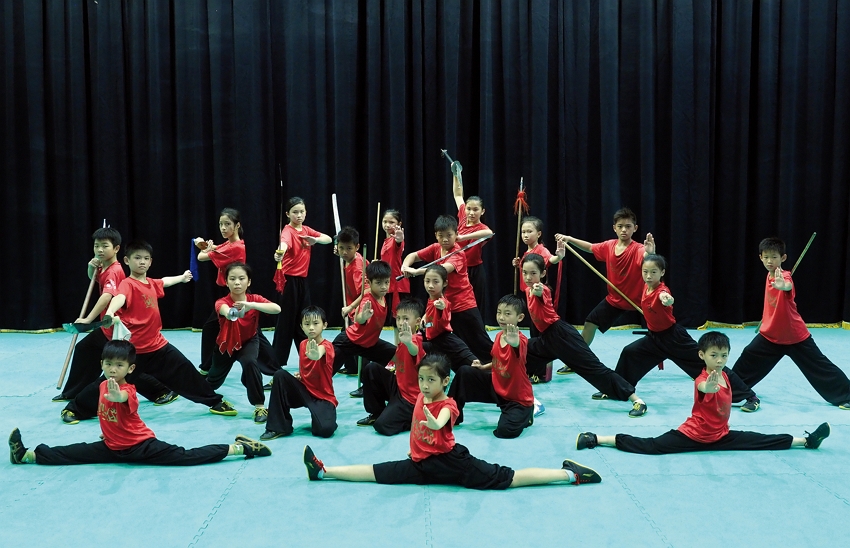
The martial arts team at Yilan’s Gong Jheng Elementary School owes its dazzling achievements today to eight years of training and experience.
Martial arts build health and character
The martial arts form an important part of traditional Chinese culture. In 1990, they were included for the first time in the Asian Games. Gong Jheng Elementary School’s martial arts team is well trained in many areas, from Nanquan (Southern Fist) with its distinctive vocal articulations, through Beiquan (Northern Fist) with its magnificent vigor, to various kinds of weapons. “Only those who are proficient in their academic subjects are allowed to join the athletic training,” says Zhuang Zhongting, director of academic affairs at Gong Jheng. Cultivating both physical skills and moral character is a fundamental aim of education.
“This year we celebrate the 69th anniversary of our school. We are grateful to Magistrate Lin for praising our martial arts team in public and for encouraging them by offering financial rewards,” headmaster Chien Hsin-pin says. Gong Jheng Elementary can indeed be seen as the pride of Yilan. During the 2018 nationwide Martial Arts Games, and during the 10th Asian Junior Wushu Championships in 2019 (used as the basis for selecting the national team), the school performed remarkably well, winning 19 gold, 12 silver and eight bronze medals; in both Kuoshu and Wushu, it topped all other schools in its cumulative score, thus retaining its overall championships in both categories and reasserting its national leadership.
The martial arts team was not founded until 2011. Coach You Youren himself was previously a member of the national team. Under his training, the athletes are all martially accomplished. At Gong Jheng Elementary, fifth-grader Zhang Yixin, who individually won three gold medals in Cudgel Play, Beiquan, and Melee Weapons, and fourth-grader Chen Yunyun, who garnered gold medals in Nanquan, Special Weapons, and Weaponed Duel, have both made it to the national team and will represent Taiwan in international competitions. Third-grader You Chunan surprised everyone by winning the gold medal in Neijiaquan (Internal-style Fist) in his first ever competition.

Gong Jheng Elementary took first place in the girls’ 1200-meter relay race at the 2018 Yilan County Elementary and High School Games. This photo shows one of the athletes, fifth-grader Lu Zicen.
Sports for all
“Track and field is also a prominent discipline at Gong Jheng,” says track and field coach Zhuang Zhongting, highlighting his team’s top accomplishments in many competitions over the past five years.
Gong Jheng Elementary School is the only school in Yilan County that focuses on gymnastics. In the Yilan County Gymnasium, which has no air conditioning, the coach trains athletes of all levels, who pour with sweat as they assiduously hone their skills.
“Dual development is the way forward,” Wang Hung-hsiang says. One part of it is the promotion of Sports for All, the other being the establishment of specialized coaching groups to train competitive athletes. The single-minded self-motivation of the teachers and students at Gong Jheng Elementary accords perfectly with a physical education policy that both encourages public participation and provides specialist athletic education.
“We strongly emphasize laying the groundwork of physical training and will never force children beyond their capabilities,” Zhuang Zhongting says. Gong Jheng Elementary School’s curriculum, which provides for education through enjoyment, aims to foster a school-wide culture of physical activity, using interesting games to motivate children to take a further step in their learning, and avoiding sports injuries by recognizing and respecting their limits. “Success does not have to happen here and now. A longer perspective is imperative.” From Pei-cheng to Gong Jheng, headmaster Chien Hsin-pin has held firm to this belief. Under the three-level training policy, Gong Jheng Elementary School has lived up to the aim of laying a solid foundation for future national athletes; having acquired all the basics, they will no doubt achieve steady progress and make it to the Olympics.











